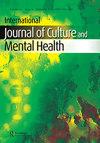阿曼公众对精神疾病的看法:一项横断面研究
Q1 Social Sciences
International Journal of Culture and Mental Health
Pub Date : 2017-05-24
DOI:10.1080/17542863.2017.1325916
引用次数: 10
摘要
世界范围内的研究表明,精神疾病患者(PWMI)容易被污名化,从而遭受社会排斥。作者调查了阿曼人对PWMI的态度,并根据社会人口变量(年龄、性别、居住地、工作地点和类型以及以前接触过PWMI)对他们的反应进行了分类,这些变量预计与他们对PWMI的看法和态度有关。数据是通过在线横断面调查在阿曼普通公众中收集的,使用精神疾病态度(AMI)问卷。考虑到阿曼人的高识字率(93.97%)、互联网使用率(66.4%)和社交媒体参与度,选择了通过社交媒体的在线方法。在601名参与者中,41.4%是男性,58.6%是女性。受试者年龄分为20 ~ 30岁(48%)和31 ~ 45岁(46%)。近90%的参与者有工作,10%是大学生。结果表明,阿曼人与世界各国一样,对PWMI抱有污名化的态度。结果进一步表明,社会人口统计变量(如城乡二分法和以前的PWMI经历)与阿曼人对精神疾病的态度有显著相关。本文章由计算机程序翻译,如有差异,请以英文原文为准。
Public perception of mental illness in Oman: a cross sectional study
ABSTRACT Studies worldwide have shown that people with mental illnesses (PWMI) tend to be stigmatized and thus suffer social exclusion. The authors investigated the attitudes of Omani people toward PWMI, and classified their responses on the basis of socio-demographic variables (age, gender, place of residence, place and type of employment, and previous exposure to PWMI) that were expected to correlate with their perceptions and attitudes towards PWMI. The data were collected by means of an online cross-sectional survey among the general Omani public, using the Attitude toward Mental Illness (AMI) Questionnaire. The online method via social media was selected in view of the high levels of literacy (93.97%), Internet usage (66.4%), and social media participation among Omanis. Of the 601 participants, 41.4% were men and 58.6% were women. The subjects were categorized in the age groups of 20–30 years (48%) and 31–45 years (46%). Nearly 90% of the participants were employed, while 10% were college students. The results indicated that Omanis share the worldwide tendency to harbor stigmatizing attitudes towards PWMI. The results further suggested that socio-demographic variables (such as urban–rural dichotomy and previous encounters with PWMI have significant correlation with Omanis’ attitudes towards the mentally ill.
求助全文
通过发布文献求助,成功后即可免费获取论文全文。
去求助
来源期刊

International Journal of Culture and Mental Health
Social Sciences-Cultural Studies
CiteScore
2.10
自引率
0.00%
发文量
0
期刊介绍:
This title has ceased (2018). This important peer-review journal provides an innovative forum, both international and multidisciplinary, for addressing cross-cultural issues and mental health. Culture as it comes to bear on mental health is a rapidly expanding area of inquiry and research within psychiatry and psychology, and other related fields such as social work, with important implications for practice in the global context. The journal is an essential resource for health care professionals working in the field of cross-cultural mental health.Readership includes psychiatrists, psychologists, medical anthropologists, medical sociologists, psychiatric nurses and social workers, general practitioners and other mental health professionals interested in the area. The International Journal of Culture and Mental Health publishes original empirical research, review papers and theoretical articles in the fields of cross-cultural psychiatry and psychology. Contributions from the fields of medical anthropology and medical sociology are particularly welcome. A continuing dialogue between members of various disciplines in various fields is encouraged. The aim of the journal is to encourage its readers to think about various issues which have clouded cross-cultural development of ideas. The journal lays special emphasis on developing further links between medical anthropology, medical sociology, clinical psychiatry and psychology, and implications of the findings on service provisions. The journal is published four times a year. The style of reference is Harvard. All research articles in this journal, including those in special issues, special sections or supplements, have undergone rigorous peer review, based on initial editor screening and anonymized refereeing by at least two independent referees.
 求助内容:
求助内容: 应助结果提醒方式:
应助结果提醒方式:


